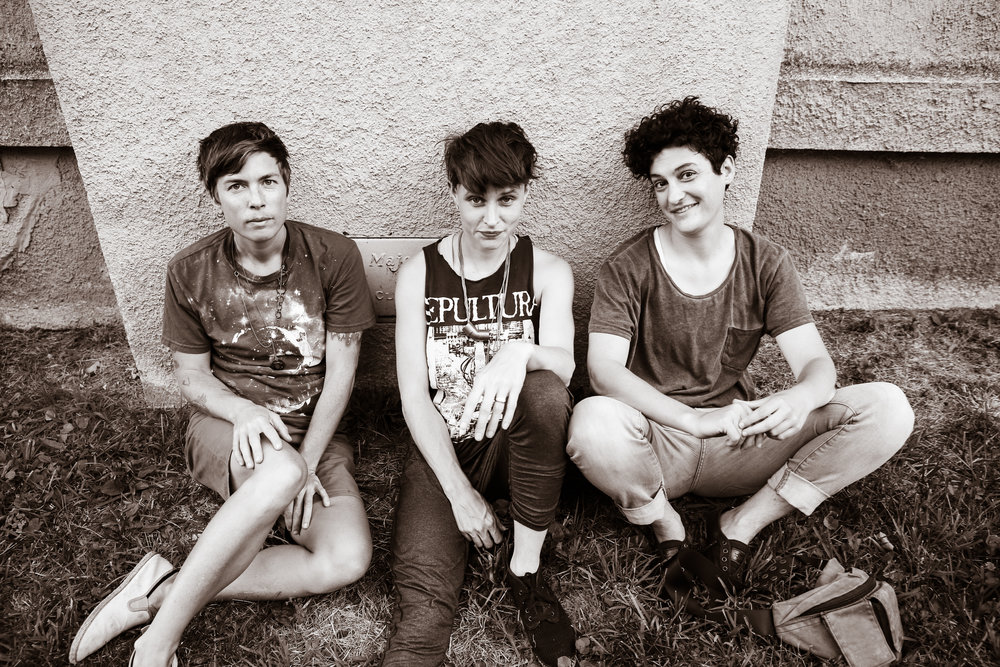
Aside from its awe-inspiring landscapes, infamously rainy winters and plethora of craft beers, the Pacific Northwest is also home to a movement that changed the anatomy of music forever – Riot Grrrl. Characterized by women led bands, blaring vocals and feminist themes, the ’90s movement aimed at encouraging women to claim music as their own and use it as a vessel for female empowerment. Effective to say the least, Riot Grrrl awakened the musical minds of thousands of women and continues to have an impact on the musical landscape today.
Among those women is Marmoset Web Developer and member of Portland-based bands Lovers and Notel, Emily Kingan. Having moved to Portland at the age of 17, Emily recounts the effect the empowering music scene of the Northwest had on her:
“I remember going to one show in particular — it was three women, and it was really obvious that they had just started playing because they would mess up a song in the middle and either start again or one of them would be like ‘It’s okay, keep going!’ and I was like, “Oh wow, you don’t have to be a total pro musician to be in a band and play a show.’ So, I just started playing with some college friends and discovered this thriving music scene. It was right in the middle of Riot Grrrl, so there were a lot of women and queers starting to play music, and it felt like a really supportive environment…I think that sort of fed me. I started playing the drums and the first band I got into that was a touring and recording band, I was playing guitar. That was a punk rock band called The Haggard. We were together for five or six years and we went all over the place — Australia, Brazil, Europe, around the US a whole bunch. And that just kinda set the tone for my life.”
After touring with The Haggard for half a decade, Emily continued to spread her roots in the Portland music scene, joining the feminist pop-rock three piece band, Lovers in 2008. Piggybacking off of founding member, Caroline Berk’s, songography, Emily and her band mate, Kerby Ferris, helped Berk make the transition from an orchestral singer-songwriter to an electro power-pop band. With the overarching theme of female and queer empowerment staying the same, Lovers’ sound evolved throughout the years. “The first album we did together was called DarkLight and it was a backlog of some really empowering songs she [Berk] had written, and I think that’s kind of what came out of her,” Emily says. “Then the second album we did was a little more poetic, there were definitely some gay anthems in there, even though it was a little more dreamy.”
In addition to upfront and empowering lyrics, Lovers — who have been on a hiatus for the past few years — used their sound to represent the ideals rooted in their music. By combining sobering lyrical themes with bright, danceable music, the band created a powerful and digestible message.
“It was kind of an interesting juxtaposition, because a lot of her [Berk’s] lyrics could be really sad if it was just an acoustic guitar, but with all the components we added, it turned it into a dance song,” Emily says. “So with a lot of the songs, they’re kind of complicated. You can be sad and wanna dance and maybe dancing about something sad. And I think even though there are some political themes to it, it showed even if you’re a marginalized group, there’s a lot of depth to someone’s personality.”
Where Riot Grrrl took a more aggressive approach, Lovers pulls thematic elements from the movement while maintaining an easygoing, bright sound. As Emily says: “The Riot Grrrl movement was this time where women were overly aggressive about wanting to take up space, because if they weren’t, then they just couldn’t move forward. That was when I started going to shows here and that was my first point of reference. And I think since then, things have really evolved and it feels much more safe as a woman to be at a show.”
While Emily praises the nurturing community of the Portland music scene and evolution of the industry in general, she’s had her share of frustrations as a touring female musician. Ranging from soundmen who don’t think women know how to use electronics to a well-meaning Irish graphic designer who used the women’s bathroom symbol to promote a Lovers concert, the industry still has a ways to go in achieving equality between male and female focused artists. “I’m really tired of being pigeon-holed as a female band,” Emily says. “Can’t we just be a band?”
The first step in bridging the gap is to acknowledge that there is one. As Emily observes, “I think that young men are often encouraged to play music more than young women, so they automatically have more of a launch pad…I think that’s changing now with the Rock ‘n’ Roll Camp for Girls and all that, but I think it’s great to highlight more female musicians and be aware that there is that discrepancy.”
Emily is currently focused on playing with a new Portland-based band, Notel, as well as kicking ass at Marmoset as a Web Developer. Although Lovers is taking a break, you can still listen to their catalog here, or enjoy a sampling of other female-fronted Marmoset artists below.
